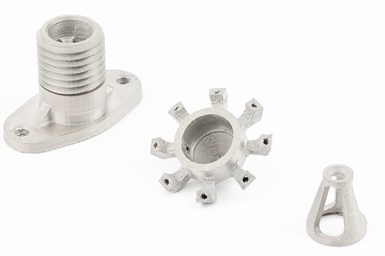Desktop Metal Qualifies Titanium for Manufacturing with Studio System 2
Desktop Metal is first company to commercialize titanium for bound metal production of high-strength, lightweight components, opening the door to more accessible additive manufacturing production of high-performance titanium parts.

(Left to right) Drone coupling, fuel injector nozzle and telescope focus ring in titanium produced with Studio System 2.
Desktop Metal, a provider of mass production and turnkey additive manufacturing (AM) solutions, has qualified the use of titanium alloy Ti-6Al-4V (Ti64) for its Studio System 2, which is said to be an accessible metal 3D printing platform that offers customers the easiest way to print high-performance metal parts in low volumes for preproduction and end-use applications.
The company says it will be the first and only company to make the material commercially available for extrusion-based bound metal AM technologies.
Ti64 is said to be the most widely used titanium alloy and is characterized by its high tensile strength, corrosion resistance and biocompatibility. With a high strength-to-weight ratio, Ti64 is well suited for high-performance production applications in industries such as aerospace and defense, automotive, and oil and gas. In addition, its biocompatibility makes it desirable in medical applications, such as in surgical devices and implants.
The Studio System 2 produces Ti64 with exceptional mechanical properties, the company says. Tensile properties include 730 MPa yield strength, 845 MPa ultimate tensile strength, and 17% elongation. These mechanical properties exceed those set by ASTM F2885-17 standards for metal injection molded surgical implant applications.
“Titanium has been a challenging material for bound metal 3D printing because it is both extremely reactive in powder form and difficult to sinter,” says Jonah Myerberg, Desktop Metal co-founder and CTO. “We are excited to be the first to commercialize the most common titanium alloy, Ti64, for 3D printing through our Studio System 2 solution, opening the door to more accessible production of high-performance titanium parts.”
3D printing with titanium is said to be incredibly valuable in industries such as aerospace because of the material’s ability to support complex and lightweight designs.
“With the Studio System 2, the team at Privateer Space will be able to achieve the affordability and lightweighting capabilities needed to pave the way for our satellite design and launch,” says Steve Wozniak, co-founder of Privateer Space, a satellite company focused on monitoring and cleaning up objects in space. “This technology is truly a differentiator in helping companies to accelerate innovations in space and, through the material advancements that Desktop Metal is making, we have an amazing opportunity to collaborate and keep space accessible for future generations.”
Related Content
-
Reusable LOX/Kerosene Engine Completes First Successful Full-System Test Flight
Galactic Energy Space Technology announced the first successful full-system test flight of its Welkin 50-ton reusable LOX/kerosene engine. To date, this is the highest thrust LOX/kerosene engine in the Chinese commercial aerospace playing field which has officially entered the engineering and manufacturing phase.
-
Velo3D Founder on the 3 Biggest Challenges of 3D Printing Metal Parts
Velo3D CEO and founder Benny Buller offers this perspective on cost, qualification and ease of development as they apply to the progress of AM adoption in the future.
-
GE Additive Helps Build Large Metal 3D Printed Aerospace Part
The research is part of an initiative to develop more fuel-efficient air transport technologies as well as a strong, globally competitive aeronautical industry supply chain in Europe.














